-
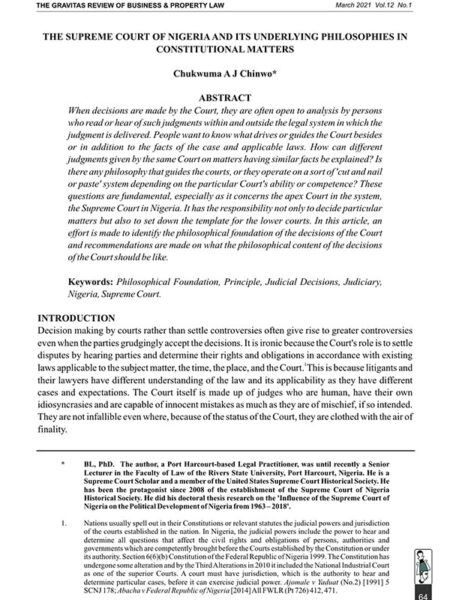
The Supreme Court of Nigeria and its Underlying Philosophies in Constitutional Matters
0₦2,500.00Dr Chukwuma Chinwo, formerly Senior Lecturer at the Rivers State University, and now a Port Harcourt-based Legal Practitioner in his article, The Supreme Court of Nigeria and its Underlying Philosophies in Constitutional Matters, asks a question that bothers many: How can the same Court give different judgments on matters having similar facts? Dr Chinwo examines the Supreme Court of Nigeria’s judicial philosophy. From an extensive review of several Supreme Court decisions, he weaves a coherent thread of factors that influence the Court’s judgments.
-

The Supreme Court of Nigeria Decision in Gbetu V. Itie: Is It a Case of Termination or Dismissal from Employment?
0₦2,500.00Faith Opara and Olasupo Bada in their case review article, The Supreme Court of Nigeria Decision in Gbetu V. Itie: Is It a Case of Termination or Dismissal from Employment? examine the decision of the Supreme Court in Gbedu v. Itie that employees’ whose employment was brought to an end by liquidation were by this token, dismissed from the employ of the liquidated company. Relying on primary and secondary data, they examine the propriety of this decision in the light of the legal connotation of termination and dismissal from employment. Opara and Bada examine the meaning and legal effect of termination and dismissal from employment under Nigerian labour jurisprudence and found that the decision was reached per incuriam. Therefore, lower courts are urged to distinguish and depart from the decision when faced with similar situation while the SCN is urged to overrule itself where the opportunity present itself subsequently.
-
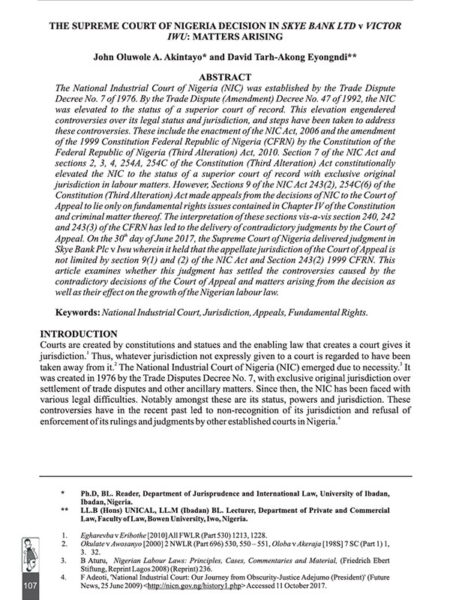
The Supreme Court of Nigeria Decision in Skye Bank Ltd v Victor Iwu: Matters Arising
0₦2,500.00John Akintayo, Reader, Department of Jurisprudence and International Law, University of Ibadan and David Eyongndi of the Department of Private and Commercial Law, Bowen University in their article, The Supreme Court of Nigeria Decision in Skye Bank Ltd. v. Victor Iwu: Matters Arising, consider the Iwu’s case as pivotal in the chequered jurisdictional history of the National Industrial Court (NIC). They analyse the relevant provisions of the NIC Act, 2006 and the Constitution of the Federal Republic of Nigeria (Third Alteration) Act, 2010. They examine the matters arising, and the unintended consequences of the decision in Iwu: that the appellate jurisdiction of the Court of Appeal to entertain appeals from the National Industrial Court is not restricted to fundamental rights issues contained in Chapter IV of the Constitution.
-
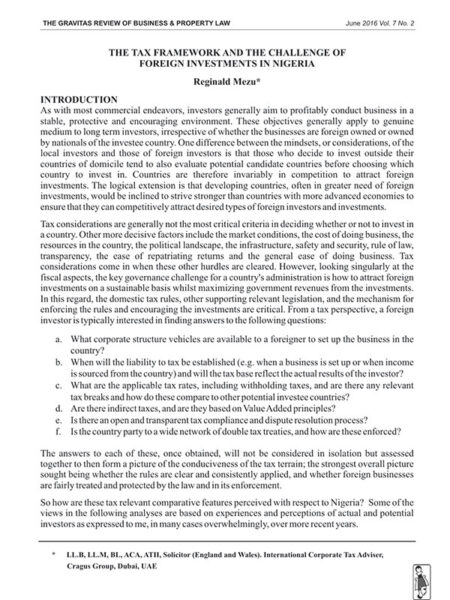
The Tax Framework and the Challenge of Foreign Investments in Nigeria
0₦2,500.00Reginald Mezu, International Corporate Tax Adviser, Cragus Group, Dubai, UAE in his article, “The Tax Framework and The Challenge of Foreign Investments in Nigeria” posits that Nigeria has fared badly in attracting foreign investments, save in the oil and gas industry (possibly due to the natural resource simply being located in the country) or the telecommunications industry (possibly due to the population demand and the surfeit of supply from the public services) because it has failed to make the grade in relevant parameters that foreign investors consider. He recommends flexibility in the options for foreign investors to establish operating entities in the country, clearer tax rules and better targeted tax incentives, among others, to send a strong signal that the country is ready to do business with foreign investors in a stable, protective and encouraging environment.
-
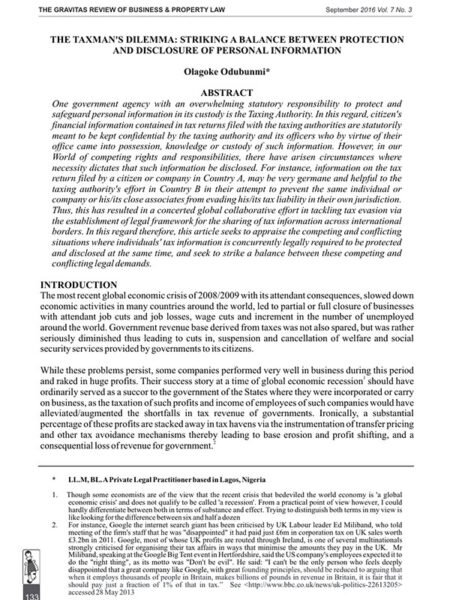
The Taxman’s Dilemma: Striking a Balance between Protection and Disclosure of Personal Information
0₦2,500.00Olagoke Odubunmi, Legal Practitioner, Lagos in “The Taxman’s Dilemma: Striking A Balance Between Protection and Disclosure of Personal Information” examines several provisions of the Companies Income Tax Act and Personal Income Tax Act on protection of personal information of a tax payer against other provisions of national legislations and international obligations mandating disclosure in an era of concerted global efforts against tax evasion, base erosion and profit shifting.
-
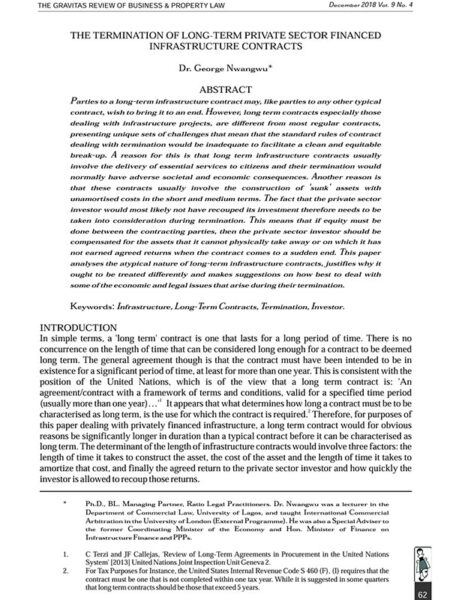
The Termination of Long-Term Private Sector Financed Infrastructure Contracts
0₦2,500.00Dr George Nwangwu, Managing Partner, Ratio Legal Practitioners, and Special Adviser to the former Minister of Finance on Infrastructure Finance and PPPs in his article, The Termination of Long-Term Private Sector Financed Infrastructure Contracts, observes that long-term contracts especially those dealing with infrastructure projects, are different from most regular contracts, presenting unique sets of challenges that mean that the standard rules of contract dealing with termination would be inadequate to facilitate a clean and equitable break-up. Dr Nwangwu analyses the atypical nature of long-term infrastructure contracts, justifies why it ought to be treated differently and makes suggestions on how best to deal with some of the economic and legal issues that arise during their termination.
-
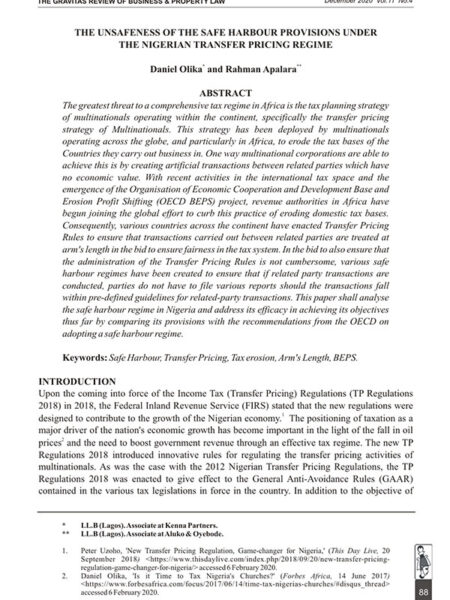
The Unsafeness of the Safe Harbour Provisions Under the Nigerian Transfer Pricing Regime
0₦2,500.00Daniel Olika of Kenna Partners and Rahman Apalara of Aluko & Oyebode in their article, The Unsafeness of the Safe Harbour Provisions Under the Nigerian Transfer Pricing Regime, note that a significant threat to a comprehensive tax regime in Africa is the tax planning, especially transfer pricing, strategy of multinationals. Multinationals have deployed the strategy to erode the tax bases of the countries where they carry out business. One way multinationals do this is by creating artificial transactions between related parties which have no economic value. With the emergence of the Organisation of Economic Cooperation and Development’s Base and Erosion Profit Shifting (OECD BEPS) project, tax authorities across the continent have enacted Transfer Pricing Rules to ensure that transactions carried out between related parties are treated at arm’s length. To ensure that the administration of the Transfer Pricing Rules is not cumbersome, various safe harbour regimes have been created to ensure that if related party transactions are conducted, parties do not have to file various reports should the transactions fall within pre-defined guidelines for related-party transactions. Daniel and Rahman analyse the safe harbour regime in Nigeria by comparing its provisions with the recommendations from the OECD on adopting a safe harbour regime.
-
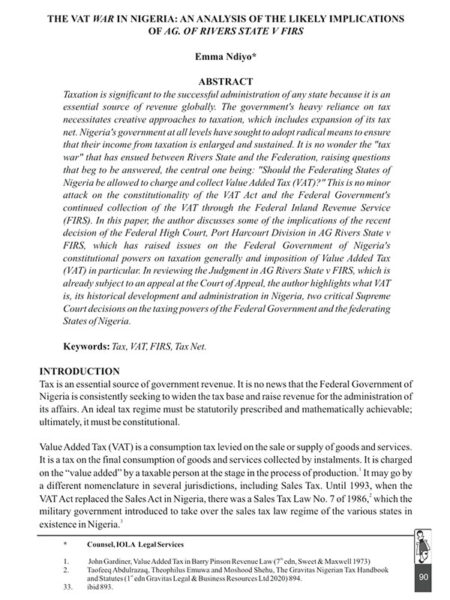
The VAT War in Nigeria: An Analysis of the Likely Implications of AG Rivers State v FIRS
0₦2,500.00Emma Ndiyo, Counsel at IOLA Legal Services, weighs in on the VAT debate in her article, The VAT War in Nigeria: An Analysis of the Likely Implications of AG Rivers State v FIRS. She discusses some of the implications of the recent decision of the Federal High Court in AG Rivers State v FIRS which has raised issues on the Federal Government of Nigeria’s constitutional powers on taxation generally and imposition of Value Added Tax (VAT) in particular. In reviewing AG Rivers State v FIRS, Emma highlights the historical development and administration of VAT in Nigeria. She reviews the Supreme Court decisions in AG Ogun State v Aberuagba and AG Lagos State v Eko Hotels on the taxing powers of the Federal Government and the federating states. She concludes with her thoughts on steps for improved tax administration in the country.
-
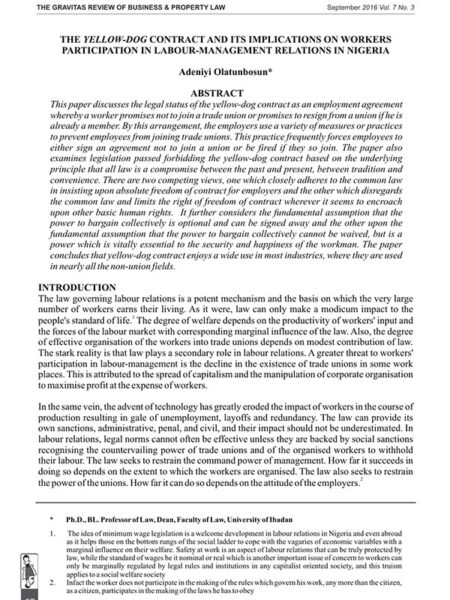
The Yellow-Dog Contract and its Implications on Workers Participation in Labour-Management Relations in Nigeria
0₦2,500.00Professor Adeniyi Olatunbosun, Dean, Faculty of Law, University of Ibadan in “The Yellow-Dog Contract and Its Implications on Workers Participation in Labour-Management Relations in Nigeria” discusses the legal status of the yellow-dog contract as an employment agreement whereby a worker promises not to join a trade union or promises to resign from a union. He examines statutory provisions prohibiting workers from joining a trade union and those forbidding the yellow-dog contract. He explores two competing views, one which adheres to the common law in insisting upon absolute freedom of contract for employers and the other which limits the right of freedom of contract wherever it seems to encroach upon other basic human rights. He concludes that the yellow-dog contract enjoys a wide use in most industries, where they are used in nearly all the non-union fields.
-
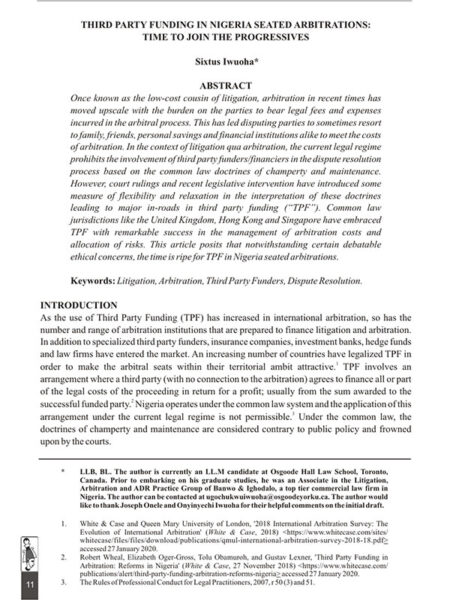
Third-Party Funding in Nigeria Seated Arbitrations: Time To Join The Progressives
0₦2,500.00Sixtus Iwuoha, formerly of Banwo & Igholado and now of the Osgoode Hall Law School, Toronto Canada, in his article, Third-Party Funding in Nigeria Seated Arbitrations: Time To Join The Progressives, posits that Arbitration, once known as the low-cost cousin of litigation, has moved upscale with a heavy burden on the parties to bear legal fees and expenses incurred in the arbitral process. This has led disputing parties to sometimes resort to family, friends, personal savings and financial institutions alike to meet the costs of arbitration. In the context of litigation qua arbitration, Nigeria’s current legal regime prohibits the involvement of third-party funders/financiers in the dispute resolution process based on the common law doctrines of champerty and maintenance. However, court rulings and recent legislative intervention have introduced some measure of flexibility and relaxation in the interpretation of these doctrines leading to major in-roads in third party funding TPF in jurisdictions like the United Kingdom, Hong Kong and Singapore. Sixtus concludes that notwithstanding certain debatable ethical concerns, the time is ripe for TPF in Nigeria seated arbitrations.
-
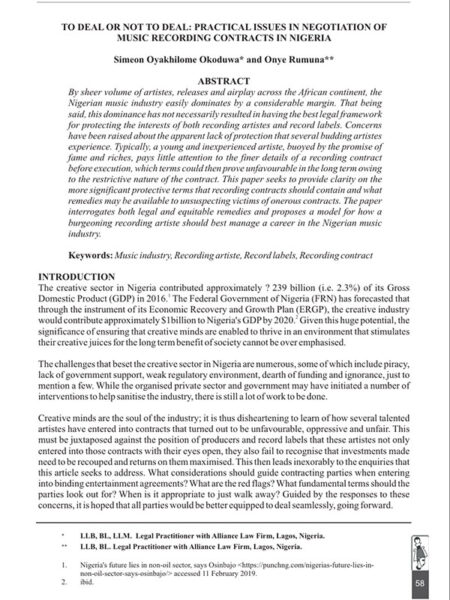
To Deal or not to Deal: Practical Issues in Negotiation of Music Recording Contracts in Nigeria
0₦2,500.00Simeon Okoduwa and Onye Rumuna of Alliance Law Firm, Lagos Nigeria in their article, To Deal or Not to Deal: Practical Issues in Negotiation of Music Recording Contracts in Nigeria, reflect that typically, a young and inexperienced artiste, buoyed by the promise of fame and riches, pays little attention to the finer details of a recording contract before execution, which terms could then prove unfavourable in the long term owing to the restrictive nature of the contract. Okoduwa and Rumuna provide clarity on the significant protective terms that recording contracts should contain and what remedies may be available to unsuspecting victims of onerous contracts. They propose a model for how a burgeoning recording artiste should best manage a career in the Nigerian music industry.
-
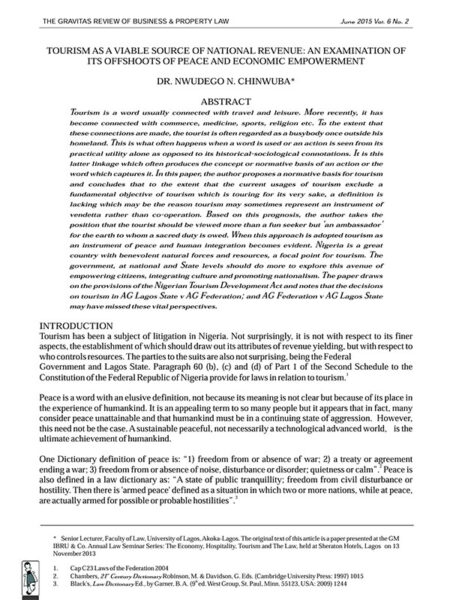
Tourism as a Viable Source of National Revenue: An Examination of its Offshoots of Peace and Economic Empowerment
0₦2,500.00Dr. Nwudego Chinwuba of the University of Lagos discusses how Tourism can be an instrument for peace and development and advocate an amendment of the Constitution and the NTDC Act for advancement of tourism in Nigeria in her article “Tourism as a Viable Source of National Revenue: An Examination of its Offshoots of Peace and Economic Empowerment”.
The Gravitas Review of Business & Property Law



